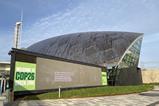Media and tech firmsÔÇÖ desire to provide their young talent with playful and flexible working spaces embedded in a vibrant community is changing how we build
There are some interesting things happening in the world of work. Bloomberg, the tech and communications giant, has just completed its £1bn headquarters in London. It is a tour de force, a palazzo for themselves and their workers. Similarly, Apple, Microsoft, Amazon and Google, the new global monopolies, are building extraordinary facilities to attract the very best to join them to drive home their dominance. Their employees are the new gilded princes and princesses and they come from the world of technology and media. Fat cat bankers are so last millennium.
At the other end of the scale, start-up media and tech entrepreneurs enjoy their freedom and work in clubs, communes, co-working hubs or anywhere they fancy that ÔÇťturns them onÔÇŁ. Shoreditch House at three oÔÇÖclock on a workday afternoon with its industrial strength Wi-Fi is a-buzz with the clacking of Apple MacBook keyboards around the table tennis tables that have convenient power points underneath.
The very best macchiato is served by well-trained eager young things, to keep those hipstersÔÇÖ minds pin sharp and creative. Meanwhile co-working space provider WeWork has turned into the CityÔÇÖs biggest leaser.
All recessions usher in innovation, and this last one did it with a digital vengeance
So where does this leave the average corporate? Beached in-between? Before the credit crunch I used to try and persuade my big clients to adopt a more enlightened way of working rather than just carpet bombing their offices with rows of desks while managers looked on from isolated offices. Some of them even did pilots of various types of ÔÇťnew ways of workingÔÇŁ that seemed to work ÔÇô in fact we did our first agile working project for a major bank in the early 1990s, but it didnÔÇÖt catch on; they were all too busy making money in the boom to want to change, they just wanted to hire more staff, chain them to those desks, and make bigger profits.
All recessions usher in innovation, and this last one did it with a digital vengeance; it was the perfect storm between necessity, motivation and opportunity. Technology disrupted and even destroyed some old businesses; Uber with taxis, Airbnb with family hotels, the iPhone with, well, just about everything. Suddenly every business was a tech firm. Banks were tech firms in banking, insurance companies were tech firms in insurance, etc. Processes were reinvented and costs were slashed in a new hypercompetitive market. If firms did not disrupt themselves, someone would do it to them.
And the workforce that everyone craved was the same young tech crowd that were at Google, Apple and Amazon. But they were not going to come and work in tin ceiling land. Now the corporation would bend its culture to the workforce, not vice versa. It wasnÔÇÖt just a matter of going open plan with a nice cafe.
The city is where itÔÇÖs at, where ideas are made, where culture touches business and new things happen
Research showed that choice was the magic ingredient. Choice of when and where to work, choice of work setting, choice of technology (ÔÇťIÔÇÖll bring my own thanksÔÇŁ), choice of dress code. Choice equals freedom and empowerment ÔÇô and thatÔÇÖs what was wanted. So all through corporate UK tin ceilings are Out; cafes, Zen rooms, project zones, libraries, table football, scooter tracks and turmeric lattes and protein boost smoothies on tap are In.
And then there is the corporateÔÇÖs renewed relationship to the city. Corporates nearly killed the city. If they were not off to some dreary and cheap business park they built faceless blocks with blind ground floors and security on the door instead of a warm ÔÇťreceptionÔÇŁ. Now the new worker wants to be part of the city. Who wants to work in an isolated business park? The city is where itÔÇÖs at, where ideas are made, where culture touches business and new things happen. The street and the cafes are just as much places to do business in as the office. Offices, like the Whitechapel building I work from, are opening up their facades, welcoming people into their ground spaces and becoming both activated and permeable.
Flexible, collective co-working spaces such as WeWork uses might have been seen as the antithesis of corporate culture. But now, the corporate world is keen to share buildings with WeWork and their like. Practically, itÔÇÖs handy to have a bit of swing space, but more than that itÔÇÖs good to absorb some of their zeitgeist ÔÇô it might rub off to good effect.
So there is a new world order in offices with unimaginably rich tech companies in their palaces at one end, free-spirited start-ups at the other and the corporates in-between. This is no linear hierarchy. The extremes both revel in their choices and the corporates want to steal from one to become the other. The speed of this change is extraordinary.
Jack Pringle is principal, managing director EMEA at Perkins+Will
































No comments yet